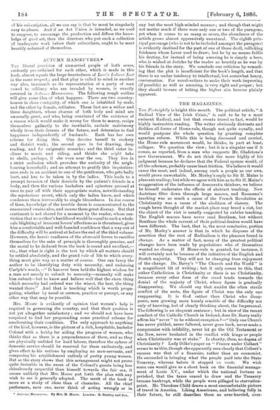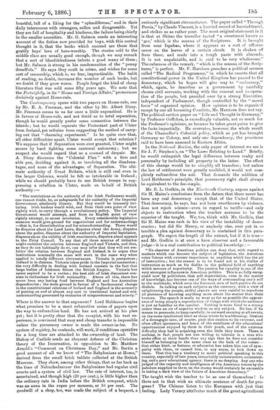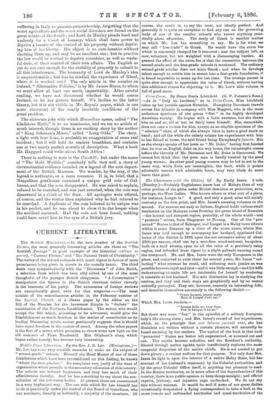THE MAGAZINES.
THE Fortnightly is bright this mouth. The political article, "A Radical View of the Irish Crisis," is said to be by a most eminent Radical, and but that events travel so fast, would be highly instructive reading. The writer obviously distrusts and dislikes all forms of Home-rule, though not quite equally, and would postpone the whole question by granting complete agrarian reform. While this is being discussed and carried, the Home-rule movement would, he thinks, in part at least, collapse. We question the view ; but it is a singular one if it comes, as reported, from a man who supports Mr. Gladstone's new Government. We do not think the more highly of his judgment because he declares that the Federal system would, of all the schemes, probably cause least friction. We believe it would cause the most, and indeed, among such a people as our own, would prove unworkable. Mr. Morley's reply to Sir H. Maine is pleasant reading; but while we agree with him as to Sir H. Maine's exaggeration of the influence of democratic thinkers, we believe he himself underrates the effects of abstract teaching. New doctrines filter down through large masses, and Rousseau's teaching was as much a cause of the French Revolution as Christianity was a cause of the abolition of slavery. The rough-hewn thought of the market-place may breed a riot, but the object of the riot is usually suggested by subtler teaching. The English masses have never read Bentham, but without Bentham the whole current of their political desires would have been different. The best, that is, the most conclusive, portion of Mr. Morley's answer is that in which he disposes of the assertion that the root of Radicalism is the pleasure found in change. As a matter of fact, many of the greatest political changes have been made by populations who of themselves wanted no change. If Horne-rule is granted, for instance, it will certainly not be because of the initiative of the English and Scotch majority. They will not be changing from enjoyment of the change. Dr. Barry's "The Church and the World" is a magnificent bit of writing ; but it only comes to this, that either Catholicism is Christianity or there is no Christianity, because every other form of the creed tends towards the denial of the majesty of Christ, whose figure is gradually disappearing. We should say that amidst the often sterile conflict of the sects, the figure of Christ was the only one reappearing. It is God rather than Christ who disap- pears, men growing more keenly sensible of the difficulty not only of knowing, but of clearly thinking about, the Impersonal. The following is an eloquent sentence ; but in view of the recent conduct of the Catholic Church in Ireland, does Dr. Barry really affirm his " never " to be without exception ?—" Only one Church has never yielded, never faltered, never gone back, never made a compromise with infidelity, never let go the Old Testament or the New, never hesitated in the conflict with kings or people when Christianity was at stake." Is charity, then, no dogma of Christianity ? Lady Dilke's paper on "France under Colbert" seems tons thin, though she apparently sees clearly that Colbert's success was that of a financier, rather than an economist. He succeeded in bringing what the people paid into the State Treasury, whereas before it stopped en route. We wish some one would give us a short book on the financial manage- ment of Louis XV., under which the national fortune so perished, that the taxes ceased to draw and the Treasury became bankrupt, while the people were pillaged to starvation- point. Mr. Theodore Child draws a most uncomfortable picture of travel in America. Liking Americans, and believing fully in their future, he still describes them as over-hurried, over-
boastful, fall of a liking for the "splendiferous," and in their daily intercourse with strangers, sullen and disagreeable. Yet they are full of hospitality and kindness, the failure being chiefly in the smaller amenities. Mr. G. Salmon sends an interesting account of the fiction now provided for boys, with this central thought in it, that the books which succeed are those that gratify boys' love of hero-worship. The stories sold to the middle class are usually good enough, though we may remark that a sort of bloodthirstiness infects a good many of them ; but Mr. Salmon is strong in his condemnation of the "penny dreadfuls." He says they exalt in crime, and wishes for some sort of censorship, which is, we fear, impracticable. The habit of reading, no doubt, increases the number of such books, but we doubt if they grow worse. People forget the kind of cheap
literature that was sold some fifty years ago. We note that the Fortnightly, in its "Home and Foreign Affairs," pronounces
decisively against Home-rule.
The Contemporary opens with two papers on Home-rule, one by Mr. E. A. Freeman, and the other by Mr. Albert Dicey. Mr. Freeman seems to us for once a little unpractical. He is in favour of Home-rule, and not timid as to total separation, though he would greatly prefer some connection between the islands ; but he would separate the Protestant part of Ulster from Ireland, yet refrains from suggesting the method of carry- ing out that "charming experiment." Is he quite sure that, all other difficulties apart, Ulster would accept that solution ? We suppose that if Separation were ever granted, Ulster might secure by hard fighting some cantonal autonomy ; but we suspect she would regard that as a counsel of despair. Mr. A. Dicey discusses the "Colonial Plan" with a firm and able pen, deciding against it, as involving all the disadvan- tages, and none of the advantages, of Separation. The ulti- mate authority of Great Britain, which is still real even in the larger Colonies, would be felt as intolerable in Ireland ; while we should probably have to use British troops in sup- pressing a rebellion in Ulster, made on behalf of British authority :—
" The restrictions on the authority of the Irish Parliament would, one cannot doubt, be, as safeguards for the authority of the Imperial .Government, absolutely illusory. Ent they would be intensely irri- tating. Irish leaders would wish, and from their own point of view rightly wish, to carry through a revolutionary policy. The Imperial Government would attempt, and from an English point of view rightly attempt, to arrest revolution. Every considerable legislative measure would give ground for negotiations and for understandings —that is, for dissatisfaction and for misunderstanding. There would be disputes about the Land Laws, disputes about the Army, disputes about the police, disputes about the authority of Imperial legislation, disputes about the validity of Irish enactments, disputes about appeals to the Privy Council. To say that all these sources of irritation might embitter the relation between England and Victoria, and that, as they do not habitually do so, one may infer that they will not em- bitter the relation between England and Ireland, is to argue that institutions nominally the same will work in the same way when applied to totally different circumstances. Victoria is prosperous ; Ireland is in distress. Victoria takes pride in the Imperial connection ; the very difficulty in dealing with Ireland consists in the fact that large bodies of Irishmen detest the British Empire. Victoria has never aspired to be a nation ; the best side of Irish discontent con- sists in enthusiasm for Irish nationality. Above all this, there has never been any lasting feud between England and her Australian dependencies ; the main ground in favour of a fundamental change in the constitutional relations of Ireland and England is the necessity of putting an end at almost any cost to traditional hatred and mis- understanding generated by centuries of misgovernment and misery."
Where is the answer to that argument ? Lord Hobhouse begins what promises to be a most exhaustive series of papers upon the way to enfranchise land. He has not arrived at his plan yet ; but it is pretty clear that the essayist, with his vast ex- perience, is convinced that easy and cheap transfer is impossible
unless the possessory owner is made the owner-in-fee. No system of registry, he contends, will work, if conditions operative for a long time are attached to the ownership of land. The Bishop of Carlisle sends an eloquent defence of the Christian theory of the Incarnation, in opposition to Mr. Matthew Arnold's "Comment on Christmas Day," and Mr. Berth' a good account of all we know of "The Babylonians at Home,"
derived from the small brick tablets collected at the British Museum. They show, among other things, that as far back as the time of Nebuchadnezzar the Babylonians had regular civil
courts and a system of civil law. The rate of interest, too, is ascertained, and though high (20 per cent.), is little higher than the ordinary rate in India before the British conquest, which was an alma in the rupee per mensem, or 16 per cent. The goodwill of a shop, too, was made the subject of a bequest, a
curiously significant circumstance. The paper called "Through Persia," by Claude Vincent, is a hurried record of hurried travel, and strikes us as rather poor. The most original statement in it is that at Shiraz the traveller tasted "a sweetmeat known as gez,' which is the manna of the Scriptures. It is brought from near Ispahan, where it appears as a sort of efflores- cence on the leaves of a certain shrub. It is shaken off from these, and made into a tough paste with almonds.
It is not unpalatable, and is said to be very wholesome." The calmness of the remark, "which is the manna of the Scrip- tures," is perfect. Mr. F. Harrison preaches a political sermon called "The Radical Programme," in which be asserts that all constitutional power in the United Kingdom has passed to the democracy, which he hopes will give way to " sociocracy," which, again, he describes as a government by carefully chosen civil servants, working with the consent and co-opera- tion of the people, but presided over by a strong Executive, independent of Parliament, though controlled by the "moral force" of organised opinion. How opinion is to be organis:d except by our all becoming Comtists, Mr. Harrison does not say. The political-section paper on "Life and Thought in Germany," by Professor Geffcken, is exceedingly valuable, not so much for the Professor's opinions, as because he takes great pains to give the facts impartially. He overrates, however, the whole result of the Chancellor's Colonial policy, which as yet has brought Germany no Colony, and only one dependency, the provinces said to have been annexed in Eastern Africa.
In the National Review, the only paper of interest we see is Sir J. F. Stephen's, on "The Laws Relating to Land." Briefly, he would extinguish tbe legal difference between realty and personalty by including all property in the latter. The effect of this change would be to simplify all transfers ; but unless the law of settlement were greatly modified, it would not com- pletely enfranchise the soil. That demands the addition of Lord Hobhouse's principle, that possessory right shall always be equivalent to the fee-simple.
Mr. E. L. Godkin, in the Nineteenth Century, argues against Sir H. Maine's conclusions from the datum that there never has been any real democracy except that of the United States. That democracy, he says, has not been overthrown by violence, does not reject science—even in regard to tariffs—and only objects to instruction when the teacher assumes to be the superior of the taught. We, too, think with Mr. Godkin, that Sir H. Maine was rash in his view of the instability of demo- cracies; but did Sir Henry, or anybody else, ever put in so
terrible a plea against democracy as is contained in this para- graph. We regret the length of the extract, but if it is true—
and Mr. Godkin is at once a keen observer and a favourable judge—it is a real contribution to political knowledge : —
"No observer of American politics can deny that, with regard to matters which can become the subject of legislation, the American voter listens with extreme impatience to anything which has the air of instruction ; but the reason is to be found not in his dislike of instruction so much as his dislike in the political field of anything which savours of superiority. The passion for equality is one of the very strongest influences in American politics. This is so fully recog- nised now by politicians, that self.depreciation, even in the matter of knowledge, has become one of the ways of commending one's self to the multitude, which even the foremost men of both parties do not disdain. In talking on such subjects as the currency, with a view of enlightening the people, skilful orators are very careful to repudiate all pretence of knowing anything more about the matter than their hearers. The speech is made to wear as far as possible the appear- ance of being simply a reproduction of things with which the audience is just as familiar as the speaker. Nothing is more fatal to a stump orator than an air of superior wisdom on any subject. He has, if he means to persuade, to keep carefully, in outward seeming stall events, on the same intellectual level as those whom he is addressing. Orators of a demagogic turn, of course, push this caution to its extreme, and often affect ignorance, and boa-,t of the smallness of the educational opportunities enjoyed by them in their youth, and of the extreme difficulty they had in acquiring even the little they know. There is nothing, in fact, people are less willing to tolerate in a man who seeks office at their hands than any sign that he does not consider himself as belonging to the same class as the bulk of the voters— that either birth, or fortune, or education has taken him out of sym- pathy with them, or caused him, in any sense, to look down on them. That this has a tendency to make political speaking in this country, especially of late years, rematkably uninstractive, uninterest- ing, and a poor educational agency, there is no denying. Any one who judged of the capacity and intelligence of the American voters by the pabulum supplied to them on the stump would certainly be excusable in taking a dark view of the future of American democracy."
The taught wish the teacher to be as one of themselves ! Is there not in that wish an ultimate sentence of death for pro- gress ? The Chinese listen to the European with just that feeling. Lady Verney attributes mach of the great agricultural
suffering in Italy to peasant-proprietorship, forgetting that the worst agriculture and the worst social disorders are found on the great estates of the South ; and Lord de Manley pleads hard and uselessly for a Court of Lunacy, which shall have power to deprive a lunatic of the control of his property without depriv- ing him of his liberty. His object is to cure lunatics without shutting them up, and may be an excellent one ; but in practice the law would be worked to deprive eccentrics, as well as waste- ful fools, of their control of their own affairs. The English as yet do not care enough for the stability of property to submit to all this interference. The humanity of Lord de Mauley's idea is unquestionable ; but has he studied the experience of Gheel, where it is worked out ? The only article in the number on Ireland, "Alternative Policies," is by Mr. James Bryce, to whom we mast allow at least one merit, impartiality. After careful reading, we have not discovered whether he would coerce Ireland, or let her govern herself. We incline to the latter theory, but it is not visible in Mr. Bryce's paper, which is one more statement of the nearly insoluble conditions of the great problem.
The elaborate joke with which Macmillan opens, called " The Gladstone Myth," is to us wearisome, and we see no article of much interest, though there is an exciting story by the author of" King Solomon's Mines," called "Long Od.ds." The story, a fight with four lions, is probably an exaggeration of some real incident ; but it will hold its readers breathless, and contains one or two nearly perfect morsels of description. What a book Mr. Haggard could write about South Africa!
There is nothing to note in the Cornhill ; but under the name of "The Gold Wulfric," somebody tells very well a story of circumstantial evidence founded on a legend of the coin depart- ment of the British Museum. We wonder, by the way, if the legend is authentic, or a mere romance. It is, in brief, that a Neapolitan gentleman examined a unique gold coin of Gal- lienus, and that the coin disappeared. He was asked to explain, refused to be searched, and was just arrested, when the coin was discovered in a chink of the floor. All apologies were offered, of course, and the visitor then explained why he had refused to be searched. A duplicate of the coin believed to be unique was in his pocket, and he was about to show it to the keeper when the accident occurred. Had the coin not been found, nothing could have saved him in the eyes of a British jury.
















































 Previous page
Previous page